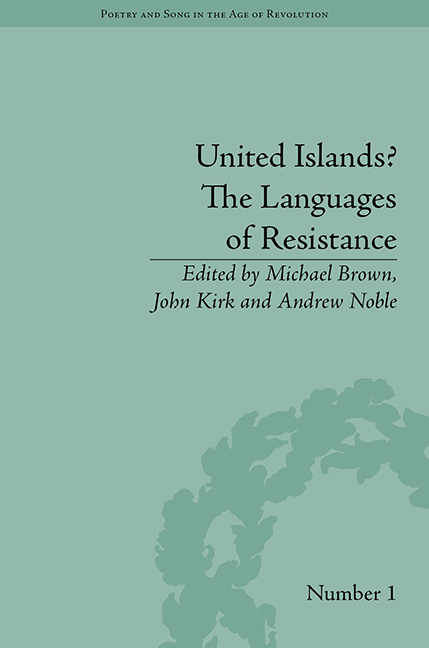Book contents
- Frontmatter
- CONTENTS
- Acknowledgements
- List of Figures and Tables
- List of Contributors
- Introduction: The Languages of Resistance: National Particularities, Universal Aspirations
- 1 Reading the English Political Songs of the 1790s
- 2 Why should the Landlords have the Best Songs? Thomas Spence and the Subversion of Popular Song
- 3 ‘Bard of Liberty’: Iolo Morganwg, Wales and Radical Song
- 4 Canonicity and Radical Evangelicalism: The Case of Thomas Kelly
- 5 Charlotte Brooke's Reliques of Irish Poetry: Eighteenth-Century ‘Irish Song’ and the Politics of Remediation
- 6 Homology, Analogy and the Perception of Irish Radicalism
- 7 Lost Manuscripts and Reactionary Rustling: Was there a Radical Scottish Gaelic Poetry between 1770 and 1820?
- 8 Virile Vernaculars: Radical Sexuality as Social Subversion in Irish Chapbook Verse, 1780–1820
- 9 Thomas Moore and the Problem of Colonial Masculinity in Irish Romanticism
- 10 Radical Politics and Dialect in the British Archipelago
- 11 ‘Theaw Kon Ekspect No Mooar Eawt ov a Pig thin a Grunt’: Searching for the Radical Dialect Voice in Industrial Lancashire and the West Riding, 1798–1819
- Afterword: The Languages of Resistance
- Notes
- Works Cited
- Index
1 - Reading the English Political Songs of the 1790s
- Frontmatter
- CONTENTS
- Acknowledgements
- List of Figures and Tables
- List of Contributors
- Introduction: The Languages of Resistance: National Particularities, Universal Aspirations
- 1 Reading the English Political Songs of the 1790s
- 2 Why should the Landlords have the Best Songs? Thomas Spence and the Subversion of Popular Song
- 3 ‘Bard of Liberty’: Iolo Morganwg, Wales and Radical Song
- 4 Canonicity and Radical Evangelicalism: The Case of Thomas Kelly
- 5 Charlotte Brooke's Reliques of Irish Poetry: Eighteenth-Century ‘Irish Song’ and the Politics of Remediation
- 6 Homology, Analogy and the Perception of Irish Radicalism
- 7 Lost Manuscripts and Reactionary Rustling: Was there a Radical Scottish Gaelic Poetry between 1770 and 1820?
- 8 Virile Vernaculars: Radical Sexuality as Social Subversion in Irish Chapbook Verse, 1780–1820
- 9 Thomas Moore and the Problem of Colonial Masculinity in Irish Romanticism
- 10 Radical Politics and Dialect in the British Archipelago
- 11 ‘Theaw Kon Ekspect No Mooar Eawt ov a Pig thin a Grunt’: Searching for the Radical Dialect Voice in Industrial Lancashire and the West Riding, 1798–1819
- Afterword: The Languages of Resistance
- Notes
- Works Cited
- Index
Summary
To say that songs performed in public are complex in terms of meaning and affect is little more than stating the obvious. However, a report in the New York Times in the summer of 2009 that the City of New York settled in court for $10,001 with a man who had been arrested in Yankee Stadium for trying to go to the public restroom to urinate during the so-called seventh-inning stretch inadvertently evokes the political atmosphere of the 1790s. The arresting officer informed the man with the full bladder that he could relieve himself only after the song ‘America the Beautiful’ had been completed. Ever since 11 September 2001, ‘America the Beautiful’ rather than the traditional and apolitical ‘Take Me Out To the Ballgame’ had been sung in the seventh inning stretch (a period in a nine-inning game when the fans ritualistically celebrate the moment, usually with a collective song). The practice at Yankee Stadium had been to insist that fans remain standing at their seats during the singing of the song. Astonishingly it took almost a decade before someone finally challenged the practice in court. In the days immediately following 9/11 the singing of ‘America the Beautiful’ would have been a largely spontaneous act of grief, anger, and special respect for the heroic New York City firefighters. As time passed the song would have become something more like a solemn patriotic duty. Somewhat later the song for most people – but perhaps not the stadium guards and police who enforced the rule – would lose its original anchoring in the events of 9/11. That the situation now is different from 2001 is indicated by the lack of any protests about the court settlement and the new Yankee Stadium policy allowing fans to relieve themselves during the seventh-inning stretch.
- Type
- Chapter
- Information
- United Islands?The Languages of Resistance, pp. 35 - 50Publisher: Pickering & ChattoFirst published in: 2014

